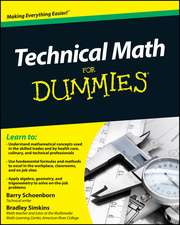Views on Fuzzy Sets and Systems from Different Perspectives: Philosophy and Logic, Criticisms and Applications: Studies in Fuzziness and Soft Computing, cartea 243
Editat de Rudolf Seisingen Limba Engleză Paperback – 21 oct 2010
| Toate formatele și edițiile | Preț | Express |
|---|---|---|
| Paperback (1) | 1232.09 lei 6-8 săpt. | |
| Springer Berlin, Heidelberg – 21 oct 2010 | 1232.09 lei 6-8 săpt. | |
| Hardback (1) | 1238.56 lei 6-8 săpt. | |
| Springer Berlin, Heidelberg – 3 apr 2009 | 1238.56 lei 6-8 săpt. |
Din seria Studies in Fuzziness and Soft Computing
- 20%
 Preț: 999.85 lei
Preț: 999.85 lei - 20%
 Preț: 653.06 lei
Preț: 653.06 lei - 20%
 Preț: 872.98 lei
Preț: 872.98 lei - 20%
 Preț: 930.57 lei
Preț: 930.57 lei - 20%
 Preț: 1051.00 lei
Preț: 1051.00 lei - 20%
 Preț: 992.44 lei
Preț: 992.44 lei - 20%
 Preț: 655.85 lei
Preț: 655.85 lei - 20%
 Preț: 1001.86 lei
Preț: 1001.86 lei - 18%
 Preț: 954.14 lei
Preț: 954.14 lei - 20%
 Preț: 330.10 lei
Preț: 330.10 lei - 20%
 Preț: 333.04 lei
Preț: 333.04 lei - 20%
 Preț: 997.56 lei
Preț: 997.56 lei -
 Preț: 391.61 lei
Preț: 391.61 lei - 20%
 Preț: 647.79 lei
Preț: 647.79 lei - 20%
 Preț: 986.01 lei
Preț: 986.01 lei - 18%
 Preț: 958.56 lei
Preț: 958.56 lei - 20%
 Preț: 996.40 lei
Preț: 996.40 lei - 20%
 Preț: 999.35 lei
Preț: 999.35 lei - 15%
 Preț: 646.43 lei
Preț: 646.43 lei - 20%
 Preț: 651.57 lei
Preț: 651.57 lei - 20%
 Preț: 997.89 lei
Preț: 997.89 lei - 15%
 Preț: 641.03 lei
Preț: 641.03 lei - 20%
 Preț: 1009.74 lei
Preț: 1009.74 lei - 20%
 Preț: 992.62 lei
Preț: 992.62 lei -
 Preț: 388.72 lei
Preț: 388.72 lei - 18%
 Preț: 1223.43 lei
Preț: 1223.43 lei - 20%
 Preț: 651.42 lei
Preț: 651.42 lei - 18%
 Preț: 951.59 lei
Preț: 951.59 lei - 18%
 Preț: 948.61 lei
Preț: 948.61 lei
Preț: 1232.09 lei
Preț vechi: 1502.55 lei
-18% Nou
Puncte Express: 1848
Preț estimativ în valută:
235.75€ • 246.17$ • 194.68£
235.75€ • 246.17$ • 194.68£
Carte tipărită la comandă
Livrare economică 15-29 aprilie
Preluare comenzi: 021 569.72.76
Specificații
ISBN-13: 9783642100994
ISBN-10: 3642100996
Pagini: 620
Ilustrații: XL, 580 p.
Dimensiuni: 155 x 235 x 33 mm
Greutate: 0.86 kg
Ediția:Softcover reprint of hardcover 1st ed. 2009
Editura: Springer Berlin, Heidelberg
Colecția Springer
Seria Studies in Fuzziness and Soft Computing
Locul publicării:Berlin, Heidelberg, Germany
ISBN-10: 3642100996
Pagini: 620
Ilustrații: XL, 580 p.
Dimensiuni: 155 x 235 x 33 mm
Greutate: 0.86 kg
Ediția:Softcover reprint of hardcover 1st ed. 2009
Editura: Springer Berlin, Heidelberg
Colecția Springer
Seria Studies in Fuzziness and Soft Computing
Locul publicării:Berlin, Heidelberg, Germany
Public țintă
ResearchCuprins
Fuzzy Sets and Systems and Philosophy of Science.- Fuzzy Systems and Scientific Method – Meta-level Reflections and Prospects.- Fuzzy Logic and Science.- Fuzzy Logic, Concepts and Semantic Transformers.- Phenomenology as a Criterion for Formalism Choice.- Computational Theory of Meaning Articulation: A Human Estimation Approach to Fuzzy Arithmetic.- Power Sets, Implications and Set Inclusions Revisited – Retrospect and Prospect: A Review of Bandler and Kohout’s Paper and a Survey of 30 Years of Subsequent Developments.- Probability and Fuzziness – Echoes from 30 Years Back.- On a Model for the Meaning of Predicates – A Naïve Approach to the Genesis of Fuzzy Sets.- Fuzzy Logic as a Theory of Vagueness: 15 Conceptual Questions.- Dialogue Games as Foundation of Fuzzy Logics.- Connecting a Tenable Mathematical Theory to Models of Fuzzy Phenomena.- Many-Valuation, Modality, and Fuzziness.- Fuzzy Thinking in Sociology.- Fuzzy Set Theory and the Philosophical Foundations of Medicine.- Fuzzy Preferences as a Convenient Tool in Group Decision Making and a Remedy for Voting Paradoxes.- What We Are Learning from Neurosciences about Decision-Making: A Quest for Fuzzy Set Technology.- Postmodernism and Control Engineering.- Fuzzy Mechanisms for Qualitative Causal Relations.- On the Relation between Fuzzy and Quantum Logic.- Fuzzy Cluster Analysis from the Viewpoint of Robust Statistics.- On the Usefulness of Fuzzy Sets in Data Mining.- The Uncertainty Associated with a Type-2 Fuzzy Set.- Fuzziness – Representation of Dynamic Changes by Ordered Fuzzy Numbers.- Meta Sets – Another Approach to Fuzziness.- Regression Model Based on Fuzzy Random Variables.- Optimal Workers’ Placement in an Industrial Environment.
Textul de pe ultima copertă
For more than four decades of its existence, the scientific "Fuzzy Group" has grown from a few engineers, working either alone or in small groups to a large scientific community. From the perspective of the history of science, it is quite normal over the course of time for such research programs to adapt themselves to the phenomena of branching out and differentiation into special projects and penetrating other disciplines. This applies not only to the distribution of research projects, the number of researchers, and the benefits of various research funding programs but also in the high profile of the subject in widely diverse fields of science, technology and business.
For more than forty years fuzzy logic and fuzzy mathematics have been continuously developed, resulting in important theoretical expansions of this mathematical theory of unsharp amounts or logic of unsharp statements, which have often very quickly led to new application systems. At the same time, the areas of artificial neural networks and of evolutionary and genetic algorithms emerged as independent research disciplines and beginning in the 1980s new developments arose that were hardly foreseeable: the theory of fuzzy sets and systems was combined with these new scientific theories and methods and the use of "hybrid systems" became more and more common in all types of applications.
In our new century, the theory of fuzzy sets and systems is in the core of "Soft Computing" and "Computational Intelligence" and has become a normal scientific theory in the fields of exact sciences and engineering and it is well on its way to becoming normal in the soft sciences as well. This book is a collection of the views of numerous scholars in different parts of the world who are involved in various research projects concerning fuzziness in science, technology, economic systems, social sciences, logics and philosophy. This volume demonstrates that there are many different views of the theory offuzzy sets and systems and of their interpretation and applications in diverse areas of our cultural and social life.
For more than forty years fuzzy logic and fuzzy mathematics have been continuously developed, resulting in important theoretical expansions of this mathematical theory of unsharp amounts or logic of unsharp statements, which have often very quickly led to new application systems. At the same time, the areas of artificial neural networks and of evolutionary and genetic algorithms emerged as independent research disciplines and beginning in the 1980s new developments arose that were hardly foreseeable: the theory of fuzzy sets and systems was combined with these new scientific theories and methods and the use of "hybrid systems" became more and more common in all types of applications.
In our new century, the theory of fuzzy sets and systems is in the core of "Soft Computing" and "Computational Intelligence" and has become a normal scientific theory in the fields of exact sciences and engineering and it is well on its way to becoming normal in the soft sciences as well. This book is a collection of the views of numerous scholars in different parts of the world who are involved in various research projects concerning fuzziness in science, technology, economic systems, social sciences, logics and philosophy. This volume demonstrates that there are many different views of the theory offuzzy sets and systems and of their interpretation and applications in diverse areas of our cultural and social life.
Caracteristici
Presenting the complete philosophy of Fuzzy Set Theory











